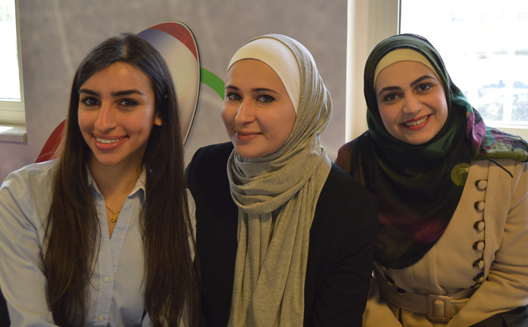Girls in Tech hosts its first bootcamp in Jordan


Participants of the first Girls in Tech bootcamp in Jordan. (Images via Tala El Issa)
One month into their existence and Jordan’s chapter of Girls in Tech (GIT) has just finished hosting its first bootcamp for 18 graduates, and soon-to-be graduates, of the country’s Information and Communication Technology (ICT) sector.
Focusing on entrepreneurship, the two-week camp exposed the participants to introductory presentations and discussions on the topic, as well as more in depth workshops about business models and business development. It was held at Amman’s The Tank, an innovation center sponsored by Umniah Telecommunications in partnership with Plug and Play.
Amongst the women participating, seven of whom were from Amman itself, there were women from various provinces including Al-Mafraq, Irbid, Al-Zarqa. Arwa Khaled, a software engineer who attended, didn’t mind the five hour daily drive to the bootcamp and back to her home in Al-Mafraq. “As fresh undergrads,” she said, “we need direction from professionals who have studied the market. The distance from my home to The Tank is far, but the bootcamp is worth putting all my effort for”.

ICT girls learning how entrepreneurship can help them in their careers.
Salam Shibli, a participant from Amman, was very impressed with the group’s diversity. “I am very happy that women from different provinces were united under one roof,” she told Wamda. “Usually such events limit their target to Ammanis who are more similar to each other than different. But GIT allowed us to meet people with new and different ideas”.
Rania Ghosheh Jaber, GIT Jordan’s General Director, as well as the managing partner of the MENA Apps accelerator, says that focusing on women in the fields of entrepreneurship and technology is a priority for two reasons:
-
Female entrepreneurs have different qualities and needs to male entrepreneurs, which makes it unfair that both of them be evaluated by the same criteria. Ghosheh realizes that this distinguishing perspective might be very controversial but she says her belief is built on her work experience which allowed her to work with both male and female entrepreneurs and observe the differences - for example, differences in approach to pitching; men being usually more confident financially, unlike women who are more conservative. Ghoseh says: “Addressing female and male entrepreneurs alike is unfair to women. It is time that we create an environment that is aware of the differences.”
-
Women’s potential in Jordan is not properly managed. “In many entrepreneurship events,” says Ghoseh, “we find a high rate of female participation but when we look at the market we find that the rate has greatly decreased.” As far as Ghoseh is concerned this means that women are aware and are willing to become entrepreneurs but there are still obstacles that prevent them from pursuing what they have learnt. “In order to get rid of these obstacles we need to study them, find their root causes and motivate women”.
The GIT’s Jordan chapter was launched at the start of March by the Jordanian Competitiveness Program, an affiliate of USAID, and is a continuation of the American nonprofit organization’s spread across the globe. Since they were established in 2007 they’ve opened branches in 35 cities, focusing on engagement, education and empowerment of women in technology and entrepreneurship. So far in the Middle East they’re present in Egypt, Kuwait, and UAE.

The juding panel. Rania Ghoseh, second from right.
On the last day, the participants presented their ideas to a judging committee who directed and advised them. Ideas ranged from medical apps, to educational platforms and political websites.
According to Ghoseh, GIT Jordan is preparing for many future events such as a summer bootcamp for university students, startup competitions, a series of monthly meetings, and the establishment of an entrepreneur-mentor network.


